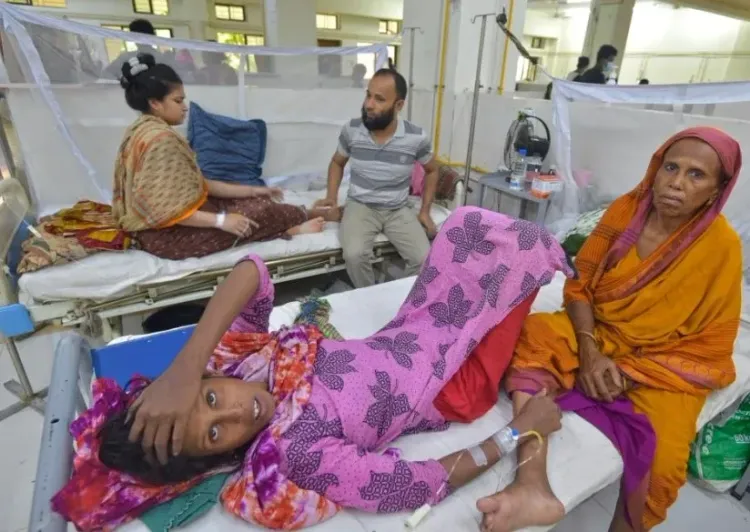Is the Dengue Crisis Escalating in Bangladesh?

Synopsis
Key Takeaways
- 14,069 dengue cases reported in Bangladesh this year.
- 54
- Comilla district identified with a spike of 72
- Health infrastructure under severe strain and inadequately prepared for the crisis.
- Urgent need for a comprehensive dengue management strategy.
Dhaka, July 12 (NationPress) The surge in dengue cases in Bangladesh is alarming, with this year's total infections soaring to 14,069 and 54 fatalities reported, as highlighted by various local media outlets. This mosquito-borne illness has revealed critical weaknesses in the nation’s health infrastructure, raising red flags among public health officials, particularly as numerous seriously ill patients struggle to obtain prompt care.
A troubling situation is unfolding in the Comilla district, where a staggering 72 new cases were identified in just one day, according to a report by Prothom Alo on Saturday.
Within the last 24 hours, 138 new dengue infections were documented nationwide, as reported by United News of Bangladesh on Friday morning.
Habibur Rahman, the Upazila Health and Family Planning Officer, indicated that blood tests for 311 individuals in private hospitals in Daudkandi confirmed 72 cases of dengue within the last day.
Of these patients, 17 are currently receiving treatment at the Daudkandi Upazila Health Complex. The statistics paint a grim picture: between June 18 and July 12 at 10 a.m., 11,022 individuals were tested, with 3,075 diagnosed with dengue.
At least 40 individuals in critical condition have been transferred to Dhaka Medical College Hospital for specialized care, with reports indicating that 10 patients have succumbed to the illness.
Concerningly, a large number of the infected are school and college students, leading to heightened anxiety among parents and educators.
While the outbreak appears to be more geographically centralized outside the capital, Dhaka remains the epicenter of dengue-related fatalities. Of the total 14,069 infections this year, 11,014 were reported from areas outside Dhaka, as stated by The Daily Star.
However, 28 of the 54 reported deaths have occurred within Dhaka city, with 22 of those falling under the jurisdiction of the Dhaka South City Corporation.
The Barishal division has become a significant hotspot, recording 5,957 infections, including 3,587 cases in Barguna district alone.
In spite of the escalating threat, the interim government, headed by Muhammad Yunus, faces intense criticism. Health experts and media reports have condemned the administration’s lack of a cohesive and comprehensive strategy to address the outbreak.
Critics assert that response measures have largely amounted to sporadic fogging and occasional clean-up efforts, which have proven inadequate in controlling the spread of the Aedes mosquito, the primary carrier of dengue.
Public health experts, physicians, and entomologists have uniformly pointed out the absence of consistent and effective preventive strategies.
Additionally, they have highlighted the country’s overburdened healthcare system as insufficiently equipped to tackle the intensifying crisis.
With no meaningful reform of the health infrastructure and a lack of a solid dengue management strategy, both urban and rural communities remain at risk.










